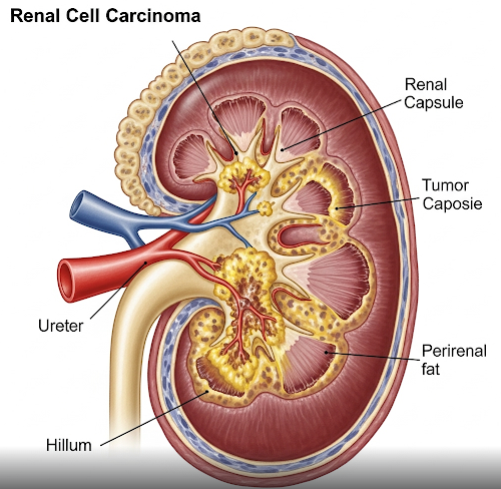Overview
Renal cell carcinoma (RCC) is the most common type of kidney cancer, originating from the lining of the small tubes in the kidney that filter blood and produce urine. RCC can be aggressive but is often treatable when detected early. Korea offers advanced diagnostic techniques and cutting-edge treatment options, including surgery, targeted therapy, and immunotherapy, delivered by expert oncologists and urologists.
What is Renal Cell Carcinoma?
Renal cell carcinoma is a malignant tumor that arises from the renal cortex’s epithelial cells. It accounts for about 90% of kidney cancers. RCC can grow silently and may spread to nearby lymph nodes or distant organs if untreated.
Symptoms
- Often asymptomatic in early stages, discovered incidentally through imaging
- Blood in urine (hematuria)
- Flank or abdominal pain
- A palpable mass in the abdomen
- Unexplained weight loss, fever, or fatigue
- High blood pressure or anemia in some cases
Causes
- Genetic mutations and environmental factors contribute
- Risk factors include smoking, obesity, hypertension, and exposure to certain chemicals
- Hereditary syndromes like von Hippel-Lindau disease increase risk
Risk Factors
- Smoking
- Obesity
- High blood pressure
- Family history of kidney cancer
- Exposure to toxic substances such as asbestos or cadmium
Complications
- Local invasion of kidney and surrounding tissues
- Metastasis to lungs, bones, liver, or brain
- Kidney failure if untreated or with extensive disease
Prevention
- Avoid smoking and reduce exposure to carcinogens
- Maintain healthy weight and control blood pressure
- Regular check-ups for high-risk individuals
Treatment Options in Korea
Diagnosis
- Ultrasound, CT scan, and MRI to detect and stage tumors
- Biopsy in selected cases for confirmation
- PET scans and bone scans for metastasis evaluation
Medical Treatments
- Targeted therapies such as tyrosine kinase inhibitors (e.g., sunitinib, pazopanib)
- Immunotherapy including checkpoint inhibitors (e.g., nivolumab)
- Systemic therapy for advanced or metastatic disease
Surgical Treatments
- Partial nephrectomy (kidney-sparing surgery) for small tumors
- Radical nephrectomy for larger or invasive tumors
- Laparoscopic and robotic-assisted surgeries are commonly performed in Korea for minimally invasive treatment
Advanced Therapies
- Ablative techniques like radiofrequency ablation or cryoablation for select cases
- Clinical trials for novel targeted and immune therapies available at major centers
Rehabilitation and Support
- Postoperative care and rehabilitation to restore kidney function
- Follow-up imaging and lab tests to monitor recurrence
- Supportive care including pain management and nutritional support
- Psychological counseling and patient education
Top Hospitals or Clinics in Korea for Renal Cell Carcinoma
- Seoul National University Hospital – Leader in kidney cancer surgery and research
- Asan Medical Center – Advanced oncology and minimally invasive surgery
- Samsung Medical Center – Specialized in robotic kidney cancer surgery
- Yonsei Severance Hospital – Comprehensive cancer care and clinical trials
- Korea University Anam Hospital – Expertise in multidisciplinary kidney cancer management













